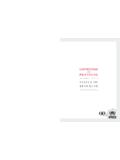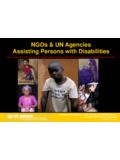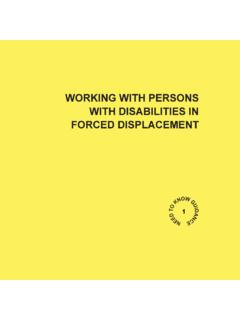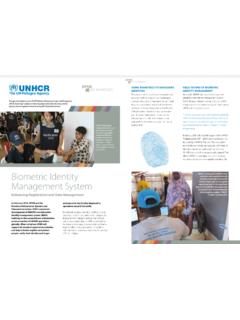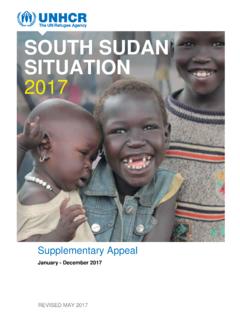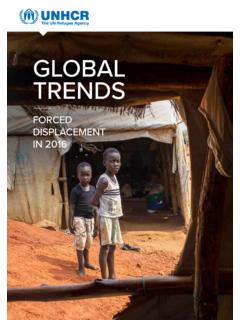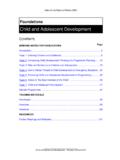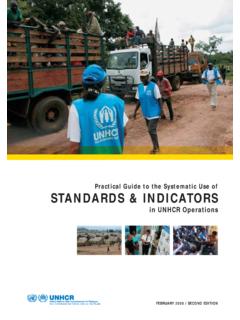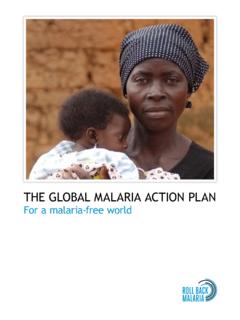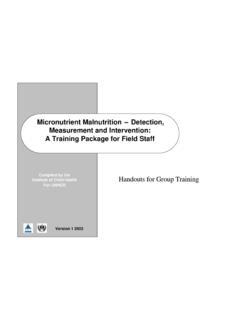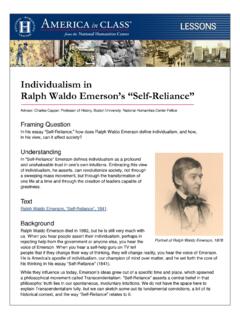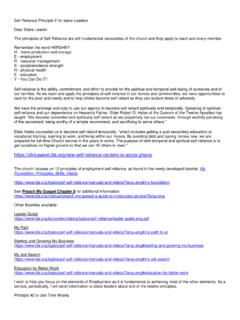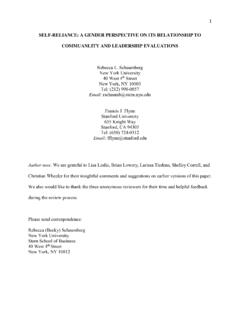Transcription of Book 1 WHY SELF-RELIANCE? - UNHCR
1 book 1 WHY SELF-RELIANCE? This section explains why it is important to direct efforts towards self - reliance - clarifying what it is, justifying its incorporation in programmes, recognisingthat it requires a change in mentality, strengthening commitment to itsadoption, stressing that UNHCR s role is to catalyse the development ofinitiatives (rather than directly implement them), and providing guidance toensure implementation is effective. It should be read by all UNHCR programme staff but has content of particular importance to representatives,their deputies and other senior managers.
2 A. What is self -relianceUNHCR s community development approach gets communities involvedin decision-making and planning (right from the emergency phase), andregards refugees as active partners in assistance and protection activities,rather than passive recipients1. The community development approachuses empowerment to enable refugees/returnees to shapetheir futures, improve their environment and overcome limitations in service provision. It is appliedfrom the start of an operation and continues throughout, working towards the identification andimplementation of durable solutions.
3 The approach involves refugees/returnees from all populationgroups (women, men, boys and girls, older persons and host communities) in programme planning,assessments, implementation and monitoring. The use of committees to represent all groups withinthe community enables everyone a voice and acts as an effective and sustainable targetingmechanism leading to community development approach builds from, and furtherenhances, self - reliance . self -relianceis the social and economic ability of an individual, a household or a community tomeet essential needs (including protection, food, water, shelter, personal safety, health andeducation) in a sustainable manner and with dignity.
4 self - reliance , as a programme approach, refersto developing and strengthening livelihoods of persons of concern, and reducing their vulnerabilityand long-term reliance on humanitarian/external assistance. self - reliance will build upon strong social structures and increasing levelsof economic activity, and social and economic links with local communities11 The policy document on the community development approach Reinforcing a Community DevelopmentApproach was endorsed by the Executive Committee to the High Commissioner s Programme in February2001. EC/51/SC/CRP. WHY self - reliance (the hosting communities among whom refugees live, or those communitiesreceiving returnees).
5 Social self - reliance refers to the ability of a communityto function with a level of cohesion, social accountability and mutualdependence-taking decisions, mobilising resources, and building andmaximising interpersonal capacity to address issues and initiatives formutual benefit. Economic self - reliance is based upon access to, andmanagement of, material and monetary assets. self - reliance provides: the basis for Durable Solutions; a foundationworking towards the Millennium Development Goals; and capacitiescontributing to the realisation of the Agenda for Why adopt self -relianceTraditional humanitarian/relief assistance is increasingly viewed asundermining the capacities of individuals to cope with crisis.
6 It leads todependency. self - reliance is a process that is feasible in your programme setting - it isappropriate in all stages of an operation. self - reliance is right no matter whatthe ultimate durable solution will be. There are a number of arguments:1. Ensuring that refugees are treated in accordance with human rights principles2. Addressing human development and self -esteem amongrefugees/returnees3. Addressing coexistence issues and peace-building4. Ensuring food security and tackling poverty reduction5. Working with host governments and poverty reduction strategies6. Guiding the UN Development Group7.
7 Building from policy8. Coping with budget constraints9. Developing donor interest10. Harmonising approaches11. Building a basis for durable solutions12. Learning jargon and recognising reality22 Goals 4 and 7 of the Agenda for Protection(2003). See Annex : 1C. The possible arguments1. Ensuring that refugees are treated in accordance with human rights principlesAll activities should be rights-based. Protection includes all activities aimedat ensuring the equal access to and enjoyment of rights by women, men, girlsand boys of concern to UNHCR - in accordance with the relevant bodies oflaw. self - reliance can, if undertaken properly, assist in ensuring that personsof concern are better protected by strengthening their capacity to claim theircivil, cultural, economic, political and social rights.
8 It can also provide a basisfor equality, equity, empowerment and participation of persons of concern, aswell as more accountability of humanitarian agencies within an operation. 2. Addressing human development and self -esteem amongrefugees/returneesOld programmes need new approaches. self - reliance can: empowerrefugee and hosting populations; renew hope and vigour; and demonstratereal and measurable changes in the nature, impact and cost of a programme- addressing protracted situations where there is no end in sight and there ispressure to do something. 3 WHY self -RELIANCESelf- reliance - a furtherstep up for refugees Addressing coexistence issues and peace-buildingAvoid conflict by sharing development benefits.
9 Disparities can lead tofriction between refugee and hosting populations. As a key component ofdevelopment processes (that are inclusive of both refugee and hostpopulations) self - reliance will promote collaboration, trust, and social andeconomic interaction between communities, and strengthen experience: Coexistence in EcuadorIn Ecuador, the spill-over of the Colombian conflict is creating a serious humanitarian crisis, withsome 1,000 Colombians requesting asylum in the country each month (June 2004). Since 2000,more than 29,000 Colombians have presented asylum claims to the Government s Refugee Office,of which some 9,000 persons have obtained refugee status.
10 Although the refugee statistics arerelatively small, estimates show that the total number of Colombians in Ecuador might be far higherand could well reach a quarter of a refugees and asylum seekers are well received by the Ecuadorian people andauthorities. The Ecuadorian Government has an effective eligibility commission to carry out refugeestatus determination and, instead of living in refugee camps or settlements, Colombians livealongside nationals, dispersed in host communities. Many settle in urban the continuous flow of Colombians into Ecuador there is an increasing need for more equitableburden-sharing.
